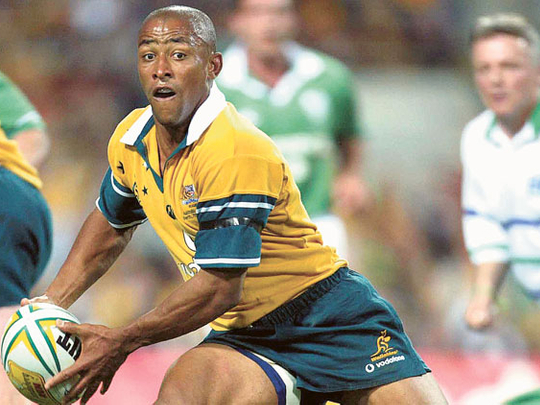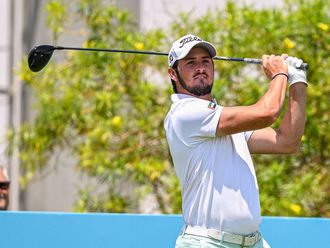
Dubai: There are few other personalities who command such a position in Australian rugby as the iconic George Gregan.
With 119 caps behind him, the former Wallabies skipper has the record for the most international caps for the rugby superpower — not to mention winning the World Cup once in 1999 and making the final four years later.
A scrum-half, the shaven-headed Gregan is respected throughout the rugby world for his tenacity, tactical skills, leadership ability and continuous chatter with referees.
He has been signed up by HSBC, the title-sponsors for the World Rugby Sevens series, as their ambassador for rugby in the Middle East and will be a special guest at the Dubai Sevens later this year.
Speaking to Gulf News exclusively, Gregan looks back at his international and club career and talks about his new role.
GULF NEWS: What would be your role as the HSBC ambassador for rugby in the Middle East?
GEORGE GREGAN: As an HSBC ambassador for the Middle East, I will play a part in bringing rugby to kids in the UAE around the Dubai Sevens at the end of this year.
This is a big part of HSBC's initiatives to support the growth and development of the sport of rugby through a series of youth festivals, providing coaching and opportunities to compete for the next generation of young players in the region.
After a club career which has taken you to various developed rugby-playing nations like France (not to speak of Australia), you have just finished playing in Japan. What do you think about the qualitative difference?
After the Rugby World Cup in 2007 in France I played one season with Toulon which was a wonderful experience.
I was able to play with instead of against players such as Andrew Mehrtens and Anton Oliver from the New Zealand All Blacks, as well as Victor Matfield, of South Africa and Dan Luger from England.
It was a wonderful experience, especially living in a foreign country with my family and meeting new people.
The same could be said of my experience in Japan where I have just completed my playing career.
I was there for three seasons and it was a great life experience because you had to embrace the Japanese culture to succeed.
They are hungry for knowledge and expertise and once they receive this information they have a very strong work ethic.
I really enjoyed both the playing and living aspects of my time in Japan.
How much has the normal sports activities taken a beating following the earthquake and tsunami on March 11?
Some of the major sports events have been put on hold.
The J League football season was put on hold from March 12 to April 23 due to the aftermath of the earthquake and tsunami.
The season began on May 5 and the matches will be played as scheduled.
Looking back, what do you think was the high point of your career, the World Cup in 1999?
The high point of my playing career was definitely winning the Rugby World Cup in 1999 as well as captaining the 2001 Brumbies team to their first Super 12 title.
It could have been two World Cups on-the-trot for you but England beat you in that close final in 2003. Were you happy with the revenge the Wallabies extracted on England with a huge win the very next year?
Yes, we were, following Australia's loss to the English in the World Cup that year.
I then led the Wallabies on a winning campaign during the 2004 season.
After defeating Scotland twice at home, the Wallabies faced the English in a World Cup replay in Brisbane, where they got their revenge, defeating England 51 to 15.
It was a great victory for each player on the team but it wasn't the World Cup final!
How do you rate the Wallabies' chances in this year's World Cup? Who do you think can be the favourites?
Australia, as one of the powerhouses of southern hemisphere rugby, have every chance of doing well particularly with the fact it is being played within their region (New Zealand).
They have built a strong contingent of young and experience players under the guidance of Robbie Deans and their recent win against New Zealand last year in the Tri-Nations will give them confidence of performing well.
In terms of favourites, you still have to place your money on New Zealand — they may have had problems in the latter stages of past World Cups but with home advantage this must be their year.
Can you tell us something about the work the George Gregan Foundation does?
My wife Erica and I set up The George Gregan Foundation in August 2005 after our son Max was diagnosed with epilepsy.
We spent time in hospital with Max and experienced first-hand the needs of many sick children and their families.
The foundation's main goal is to set up playgrounds in children's hospitals across Australia, together with training doctors who specialise in the treatment of children with epilepsy and other neurological conditions.
So far, the foundation has opened three playgrounds: Westmead, Brisbane and Sydney.








